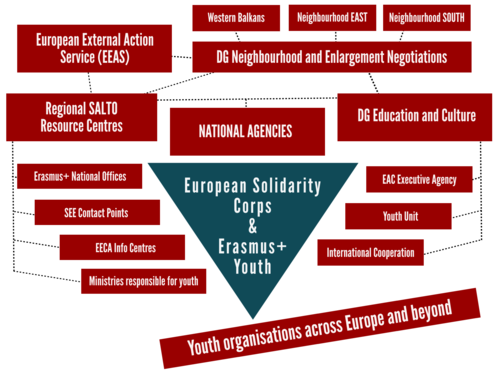Important actors
Important actors
 In every country involved in Erasmus+ and the Solidarity Corps programmes, Youth Organisations play major role implementing projects in the area of youth, directly targeting youngsters from their communities.
In every country involved in Erasmus+ and the Solidarity Corps programmes, Youth Organisations play major role implementing projects in the area of youth, directly targeting youngsters from their communities.
National Agencies are in charge of the administration and implementation of Erasmus+ and European Solidarity Corps in the Programme Countries. In case of decentralised actions of Erasmus+ programme, the National Agencies are also responsible for supporting projects with Neighbouring Partner Countries.
Western Balkans Contact Points for Erasmus+: Youth in Action and European Solidarity Corps are organisations supporting the implementation of the programmes in the Partner countries of South East Europe. Special focus is paid to opportunities for organisations in this region within the Western Balkans Youth Window.
Erasmus+ Youth and European Solidarity Corps Info Centres in Eastern Partnership countries and Russia are organisations supporting the implementation of the programmes in the Partner countries of Eastern Europe and Caucasus. Special focus is paid on support to organisations located in disadvantaged areas and/or working with young people with less opportunities.
In all neighbouring Partner countries, the national Ministries responsible for youth affairs are usually involved in Erasmus+ in different ways.
The Directorate General for Education and Culture (DG EAC) is the executive branch of the European Union responsible for policy on education, culture, youth, languages, and sport. DG EAC supports these issues through a variety of projects and programmes, notably Erasmus+ and European Solidarity Corps.
The Education, Audiovisual and Culture Executive Agency (EACEA) is responsible for the management of certain parts of the EU's funding programmes in the fields of education, culture, audiovisual, sport, citizenship and volunteering.
The mission of the Directorate-General for Neighbourhood and Enlargement Negotiations (DG NEAR) is to take forward the EU's neighbourhood and enlargement policies. DG NEAR strengthens the prosperity, stability and security around Europe as well as helps to promote EU values, policies and interests in neighbouring countries. DG NEAR is offering additional youth programmes, usually with specific priorities, in the neighbouring partner countries.
Established in 2000, SALTO-Youth is a network of eight Resource Centres working on European priority areas within the youth field. The 3 centres responsible for neighbouring partner countries provide non-formal learning resources for youth workers and leaders as well as organise training and contact-making activities to support organisations and National Agencies within the frame of Erasmus+ and European Solidarity Corps.